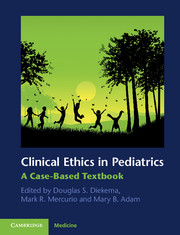Book contents
- Frontmatter
- Contents
- Contributors
- Preface
- Section 1 Core issues in clinical pediatric ethics
- Section 2 Ethical issues at the beginning of life: perinatology and neonatology
- Section 3 When a child dies: ethical issues at the end of life
- Section 4 Ethical issues posed by advances in medical technology and science
- Section 5 Children, public health, and justice
- 34 Resource allocation and triage in disasters and pandemics
- 35 Parental refusals of vaccination and school vaccine mandates: balancing parental freedom, child welfare, and public health
- 36 When institutional, professional, and public health obligations conflict: the controversial case of youth boxing
- Section 6 Special topics in pediatric ethics
- Index
- References
35 - Parental refusals of vaccination and school vaccine mandates: balancing parental freedom, child welfare, and public health
from Section 5 - Children, public health, and justice
Published online by Cambridge University Press: 07 October 2011
- Frontmatter
- Contents
- Contributors
- Preface
- Section 1 Core issues in clinical pediatric ethics
- Section 2 Ethical issues at the beginning of life: perinatology and neonatology
- Section 3 When a child dies: ethical issues at the end of life
- Section 4 Ethical issues posed by advances in medical technology and science
- Section 5 Children, public health, and justice
- 34 Resource allocation and triage in disasters and pandemics
- 35 Parental refusals of vaccination and school vaccine mandates: balancing parental freedom, child welfare, and public health
- 36 When institutional, professional, and public health obligations conflict: the controversial case of youth boxing
- Section 6 Special topics in pediatric ethics
- Index
- References
Summary
Case narrative
A 4-month-old boy is brought in by his mother for his well-child check. The child’s health care provider asks how he has been since his 2-month check-up, and his mother says he’s been generally healthy. Since the mother had been a little hesitant in agreeing to have him receive his 2-month immunizations, the provider makes sure to also ask her how things went with the immunizations after the last visit. “Terrible,” she says, “he cried for about 4 hours straight, and this is a baby who doesn’t cry. Then he was fussy for 18 to 24 hours. I am thinking it is better for him to get one shot from now on instead of three.” The provider discusses the common side effects of immunizations and reassures the mother that the self-limited symptoms her son experienced were nothing serious. She is not convinced and states that she doesn’t want to take the chance that he will have a similar experience. The boy’s physical exam is unremarkable and he appears to be happy, healthy, and thriving. The provider tries to have a further discussion with the mother about the benefits of timely immunization for her son, yet he is met with continued resistance. “I don’t want to do any vaccinations,” she says with decisiveness. “None?” the provider says somewhat surprised, since he thought she felt that one shot was acceptable. “I don’t want to take any chances,” the boy’s mother replies. The provider decides to drop the issue, and asks her to return for the 6-month visit or earlier if it’s convenient for her. She agrees, but the provider leaves the room feeling defeated.
Introduction
Provider discussions with parents who are hesitant about childhood immunizations are difficult conversations. Consequently, they do not always go well (Bryant et al., 2009). Parents report difficulty in openly discussing their concerns about vaccines with their child’s provider and feeling alienated when vaccines are discussed. Providers often provide little information to parents about immunizations, rarely validate parental concerns, and discredit parental sources of immunization information. Too much information and a lack of time, resources, and knowledge constrain a provider’s ability to effectively communicate with concerned parents during health supervision visits.
- Type
- Chapter
- Information
- Clinical Ethics in PediatricsA Case-Based Textbook, pp. 205 - 210Publisher: Cambridge University PressPrint publication year: 2011



